Brian Clegg's Blog, page 127
January 9, 2013
Ooh, I'm a green heretic
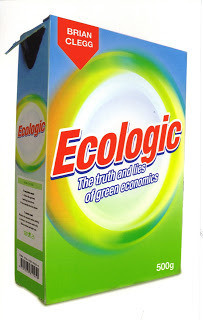 Many thanks to Karen James on Twitter for pointing out to me an article by Paul Kingsnorth for Orion Magazine* in which I get a mention as a green heretic (presumably for my book Ecologic):
Many thanks to Karen James on Twitter for pointing out to me an article by Paul Kingsnorth for Orion Magazine* in which I get a mention as a green heretic (presumably for my book Ecologic):Variations on this line have recently been pushed by the American thinker Stewart Brand, the British writer Mark Lynas, the Danish anti-green poster boy Bjørn Lomborg, and the American writers Emma Marris, Ted Nordhaus, and Michael Schellenberger. They in turn are building on work done in the past by other self-declared green “heretics” like Richard D. North, Brian Clegg, and Wilfred Beckerman.Now I could simply take issue with this 'self-declared' tag - this is not something I have ever called myself, so I'm not sure how I can be 'self-declared'. And for that matter I post-date Lomborg in writing on this stuff, rather than being a figure from his past. But rather I would like to examine Kingsnorth's argument (as he clearly doesn't agree with me) in a little detail.
This is easier said than done, because I have to say it's one of the most impenetrable articles I've ever read. (And I read scientific papers on a daily basis.) Not so much because Kingsnorth's arguments are complex, or his jargon difficult, but rather the way he puts those arguments across seems designed more to obfuscate than illuminate. I probably need to summarise the thesis, as most readers, I suspect, will, as I did on the first attempt, give up by the time they reach the fourth paragraph and find that Kingsnorth is still wittering on about the name for the handle of a scythe (I think).
Eventually we get to some content. Us 'neo-environmentalists' it seems are almost uniformly in favour of technological solutions to environmental problems. Even, dare to think it, nuclear power. We have an 'excitable enthusiasm for markets' and an 'almost religious attitude towards the scientific method.'
This is immediately put down as bad (with one proviso, which I'll come back to). But let's take away the rhetoric and see what he's attacking. It's a bad thing to be pro-science? As this is our means of getting a better understanding of the universe, I guess this means the preferred alternative is ignorance in a kind of wishy-washy sentimental rosy glow. You certainly need plenty of ignorance to think people had better lives before science intervened. Back in those lovely times when the majority of funerals were for children, when people regularly died of easily preventable diseases and when most people were uneducated, limited, overworked, had no entertainment to speak of and wouldn't have travelled more than ten miles from home. Ever. Ah, idyllic times indeed.
As for markets, I don't have an excitable enthusiasm - I think they're awful. But I also think, like democracy, despite being bad, they are the best option we have to make things work.
The one proviso where Kingsnorth reckons us heretics are 'half right' is that little human scale efforts like recycling your tights won't make enough difference. The difference being that the 'neo-environmentalists' believe we will have to engineer our way out of environmental trouble (including again those dreaded nuclear power stations), while the option Kingsnorth seems to prefer is that we all abandon pretty well everything and concentrate on getting to know our scythes. He advocates withdrawing from the technological world, without acknowledging that withdrawing is a luxury that needs that wider world to support it - unless you are truly happy to return to medieval brutishness.
I'm not against everything he says. He points out that we should recognise that nature has a value beyond utility. But the argument that this is contrary to a scientific viewpoint is that hoary old chestnut, unweaving the rainbow. The idea that somehow, for instance, knowing how a rainbow is made makes it less wondrous. And this is bilge, as it has been ever since Keats came up with the term. Knowing the science doesn't prevent you from appreciating nature at an emotional or spiritual level - quite the reverse, it enhances that appreciation. And much of science, as opposed to technology, is nothing to do with utility. The LHC and the Hubble telescope are not about utility, but about exposing the universe to our sense of wonder. It is the romantic who ignores the science who only gets the small, limited uninspired and ultimately unsatisfying view.
It is science and technology that has made it possible for Paul Kingsnorth to eulogise endlessly about the wonders of handling a scythe. If his life depended on wielding it 12 hours a day, he would not have a romantic view of it, he would come to hate it. He would have, of course, no laptop to write his article on - and no audience for his writing - he would not have the time, the finances, the energy or the opportunity to do anything other than scrabble for survival.
To pretend it is possible to return to some mythical past where we were in tune with nature and life was wonderful is romantic fantasizing at its worst. But to turn away from what science can offer is even worse. It is simply ignorant.
_____________________________________________________________________
* I have to confess to never having heard of Orion Magazine. My apologies. According to its website, Orion’s mission is to 'inform, inspire, and engage individuals and grassroots organizations in becoming a significant cultural force for healing nature and community.' Right on.
_____________________________________________________________________
Later addition: thanks to Kiley Dancy for for pointing out this great animation by Fraser Davidson illustrating Richard Feynman's brilliant counter to 'unweaving the rainbow':
Richard Feynman - Ode To A Flower from Fraser Davidson on Vimeo.
Published on January 09, 2013 00:16
January 8, 2013
Brilliant books
I have always loved science fiction, and also fantasy books set in the real world. But I have found it difficult to come across new titles I like outside my favourite authors - so this Christmas I consciously looked out for recommendations for something new to try and have read a pair of crackers that I have to get all excited about.
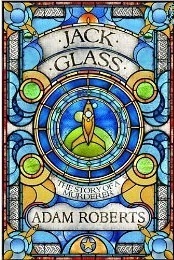 On the science fiction front, I have to confess that pretty well every author I like I already liked in the 1970s. I really haven't picked up anyone new. But I was blown away by Jack Glass by Adam Roberts. I suspect what made this for me is that Roberts consciously was setting out to write a book that took on some of the conventions of the golden ages of science fiction and crime writing - both favourites for me. It is a new book. It is a modern book. However it encompasses the best of the old. And the result is absolutely wonderful.
On the science fiction front, I have to confess that pretty well every author I like I already liked in the 1970s. I really haven't picked up anyone new. But I was blown away by Jack Glass by Adam Roberts. I suspect what made this for me is that Roberts consciously was setting out to write a book that took on some of the conventions of the golden ages of science fiction and crime writing - both favourites for me. It is a new book. It is a modern book. However it encompasses the best of the old. And the result is absolutely wonderful.
The antihero of the novel, Jack Glass, tells us up front that he is the murderer in each of three sections of the book - but this doesn't prevent the stories (which fit together almost seamlessly) from working in terms of suspense and anticipation.
The first section is probably the weakest and the middle the strongest, so if you make a start and struggle a little with the starkness of the first, do keep going. Roberts happens to be a professor of literature and if I say it doesn't show, I mean that in the best possible way. Although the book is very well written with some elegant turns of phrase, it doesn't get in the way of the storytelling as is so often the case with 'literary' writing.
If I'm going to quibble, Roberts gets the faster than light science wrong in the third section - but I always say that SF is fiction first and science second - this really isn't too much of a worry. If you like old school science fiction and haven't found anything you can really enjoy for years you should rush out and buy Jack Glass. See more at Amazon.co.uk and Amazon.com.
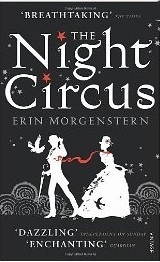 In real world fantasy I have been better served. Despite the sad loss of Ray Bradbury, some old favourites like Gene Wolfe, Terry Pratchett and Robert Rankin are going strong, while relative newcomer Neil Gaiman quickly became a favourite. However I still struggle to find something new that really appeals, so I was delighted by The Night Circus by Erin Morgenstern. I know this has been around a while, and even managed to make the long list for the Orange Prize, but it's the first time I've seen it and I was bowled over.
In real world fantasy I have been better served. Despite the sad loss of Ray Bradbury, some old favourites like Gene Wolfe, Terry Pratchett and Robert Rankin are going strong, while relative newcomer Neil Gaiman quickly became a favourite. However I still struggle to find something new that really appeals, so I was delighted by The Night Circus by Erin Morgenstern. I know this has been around a while, and even managed to make the long list for the Orange Prize, but it's the first time I've seen it and I was bowled over.
One of my favourite fantasy books ever is Ray Bradbury's Something Wicked This Way Comes. Bradbury makes the fantastical aspect of the circus that arrives by night by train truly marvellous. And Morgernstern has picked up on this concept to make something wholly new and not in any sense derivative. (I was rather peeved she didn't admit to the debt in her acknowledgments, though.) This tale of a magical duel between two unwilling and sometimes unwitting competitors and the richly described late Victorian setting it takes place in is wonderful. And at the heart of it is the night circus.
This is such a fantastic (in every sense of the word) concept. The idea of a circus that opens at nightfall and stays open at dusk, that is really more like a collection of wonderful sideshow tents, that never tells you where and when it will be next is so brilliant I feel it really could be done for real (though of course without the magic at the heart of the circus in the book). The two sets of principle characters with interweaving stories always linked through the circus are also wonderful and endearing. The cover is plastered with comments about how truly, breathtakingly captivating it is. And they don't exaggerate.
As usual I have a couple of small quibbles. The book is too long for me - I think it could have been 100 pages shorter and would have worked even better: it sagged just a little before picking up the finale. And I really don't like the use of the present tense. I have never yet read a book that is in present tense that wouldn't read better if it used the more conventional past tense. It makes the sentences seem jerky and detached from each other. For me it just doesn't add anything positive. However this book is so wonderful that it pushes that concern aside. The Night Circus is definitely in my best ever fantasy top 10. See more at Amazon.co.uk and Amazon.com.
 On the science fiction front, I have to confess that pretty well every author I like I already liked in the 1970s. I really haven't picked up anyone new. But I was blown away by Jack Glass by Adam Roberts. I suspect what made this for me is that Roberts consciously was setting out to write a book that took on some of the conventions of the golden ages of science fiction and crime writing - both favourites for me. It is a new book. It is a modern book. However it encompasses the best of the old. And the result is absolutely wonderful.
On the science fiction front, I have to confess that pretty well every author I like I already liked in the 1970s. I really haven't picked up anyone new. But I was blown away by Jack Glass by Adam Roberts. I suspect what made this for me is that Roberts consciously was setting out to write a book that took on some of the conventions of the golden ages of science fiction and crime writing - both favourites for me. It is a new book. It is a modern book. However it encompasses the best of the old. And the result is absolutely wonderful.The antihero of the novel, Jack Glass, tells us up front that he is the murderer in each of three sections of the book - but this doesn't prevent the stories (which fit together almost seamlessly) from working in terms of suspense and anticipation.
The first section is probably the weakest and the middle the strongest, so if you make a start and struggle a little with the starkness of the first, do keep going. Roberts happens to be a professor of literature and if I say it doesn't show, I mean that in the best possible way. Although the book is very well written with some elegant turns of phrase, it doesn't get in the way of the storytelling as is so often the case with 'literary' writing.
If I'm going to quibble, Roberts gets the faster than light science wrong in the third section - but I always say that SF is fiction first and science second - this really isn't too much of a worry. If you like old school science fiction and haven't found anything you can really enjoy for years you should rush out and buy Jack Glass. See more at Amazon.co.uk and Amazon.com.
 In real world fantasy I have been better served. Despite the sad loss of Ray Bradbury, some old favourites like Gene Wolfe, Terry Pratchett and Robert Rankin are going strong, while relative newcomer Neil Gaiman quickly became a favourite. However I still struggle to find something new that really appeals, so I was delighted by The Night Circus by Erin Morgenstern. I know this has been around a while, and even managed to make the long list for the Orange Prize, but it's the first time I've seen it and I was bowled over.
In real world fantasy I have been better served. Despite the sad loss of Ray Bradbury, some old favourites like Gene Wolfe, Terry Pratchett and Robert Rankin are going strong, while relative newcomer Neil Gaiman quickly became a favourite. However I still struggle to find something new that really appeals, so I was delighted by The Night Circus by Erin Morgenstern. I know this has been around a while, and even managed to make the long list for the Orange Prize, but it's the first time I've seen it and I was bowled over.One of my favourite fantasy books ever is Ray Bradbury's Something Wicked This Way Comes. Bradbury makes the fantastical aspect of the circus that arrives by night by train truly marvellous. And Morgernstern has picked up on this concept to make something wholly new and not in any sense derivative. (I was rather peeved she didn't admit to the debt in her acknowledgments, though.) This tale of a magical duel between two unwilling and sometimes unwitting competitors and the richly described late Victorian setting it takes place in is wonderful. And at the heart of it is the night circus.
This is such a fantastic (in every sense of the word) concept. The idea of a circus that opens at nightfall and stays open at dusk, that is really more like a collection of wonderful sideshow tents, that never tells you where and when it will be next is so brilliant I feel it really could be done for real (though of course without the magic at the heart of the circus in the book). The two sets of principle characters with interweaving stories always linked through the circus are also wonderful and endearing. The cover is plastered with comments about how truly, breathtakingly captivating it is. And they don't exaggerate.
As usual I have a couple of small quibbles. The book is too long for me - I think it could have been 100 pages shorter and would have worked even better: it sagged just a little before picking up the finale. And I really don't like the use of the present tense. I have never yet read a book that is in present tense that wouldn't read better if it used the more conventional past tense. It makes the sentences seem jerky and detached from each other. For me it just doesn't add anything positive. However this book is so wonderful that it pushes that concern aside. The Night Circus is definitely in my best ever fantasy top 10. See more at Amazon.co.uk and Amazon.com.
Published on January 08, 2013 00:29
January 7, 2013
The paradox of the resealable can
 It has been brought to my attention that a product called 'No Fear Extreme Energy' (a drink) comes in a 'unique resealable can.' I do wonder if the manufacturers have really thought this through.
It has been brought to my attention that a product called 'No Fear Extreme Energy' (a drink) comes in a 'unique resealable can.' I do wonder if the manufacturers have really thought this through.One issue is the implication of providing this feature. The fact you need to be able to reseal the can suggests that it is difficult to drink a whole can in one go. Does this mean it's not exactly delicious?
However there is a much deeper problem.
On my creativity seminars I often use a technique called 'the level chain' which is great for developing new product ideas. Before letting the participants loose I demonstrate a couple of uses of the technique, one of which is looking for a new paint product. The outcome of the demonstration is to come up with the idea of selling paint in cans with ring pull tops. After all, one of the biggest issues with cans of paint is opening them.
One of the reasons I use this example is that is great to remind the participants of a blockage to creativity they have to be aware of - premature evaluation. It's very easy when someone comes up with an idea to instantly spot what's wrong with it and kill it. Ideas are like little green shoots - easy to tread on with hobnail boots. And when I use the example of a ring pull can of paint I can guarantee (I ask for a show of hands) that some of those present will be thinking 'Yes, but how do you close the can?'
Those who do, miss the point. I have a great product idea, it just needs a bit of development. After all, I'm a paint manufacturer. (In the example. I'm not really, even though you can buy Brian Clegg paints.) I don't want my customers to close their cans of paint, I want them to leave them open to dry up so they'll buy more paint. What I've done is transformed a difficult question (what new and distinctive product can we make) to a simpler one (how can I persuade people to buy cans of paint you can't close).
There are lots of potential solutions to the 'can't close' problem, from selling paint in packs of small cans rather than one big one, to selling separate reseal lids. But the point is it's a good idea and I'll sell more paint.
Drinks manufacturers already have this advantage. Going on the number of half-full Coke cans I find around our house, just as mustard manufacturers were supposed to of old, Coca Cola must makes loads of dosh from the Coke that's thrown away. But No Fear is saying 'let's not make those profits.' Nice one guys. Time for a rethink.
Published on January 07, 2013 01:13
January 4, 2013
Non-fiction detritus
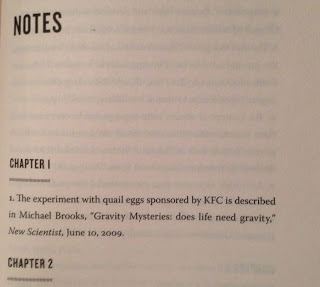 They made me do it - in Gravity I lost the battle.
They made me do it - in Gravity I lost the battle.But at least the note is funny.Although I still have yearnings to write fiction, I have to accept that, on the whole, I am a non-fiction writer, and it is something I very much enjoy doing. But there is one aspect of putting together a non-fiction book that really gets on my nerves, and that's the bit that has leaked through from textbooks and other academic literature. I hate doing notes, cross-references and the like.
I feel I have to put them in. The publisher tends to insist on notes, and I know they will moan if I don't stick in a few random cross-references. But, really! Does anyone ever follow a cross-reference? Nah, they're just there as a sort of intellectual security blanket. I occasionally get the urge to put in totally random page numbers - but of course I don't.
And don't get me started on notes.
I have a regular battle with publishers over these bits of useless information. I don't really want to do notes at all, but if I have to, which is usually the case, I insist on putting them in with page references on the note, but nothing in the main text. A couple of times (as in the illustration) a publisher has pulled numbered references on the main text on me, converting my original to this format, and I hate it. Numbered references break up the reading flow. This isn't a text book. It isn't a reference book. It's popular science - a book that should read fluidly. However subtle you make it, a numbered reference in the text will distract you.
What it won't do, though, is send the reader scurrying to the back of the book to follow it up. Because no one looks at them. Well almost no one. The only people who ever make use of reference notes are other authors who are cribbing bits out of your book and want to have an identified source. For their notes. Anyone else who claims to enjoy ploughing through notes like this is just showing off.
Oddly, though, I have just gone against my 'breaks the flow' rule with a book I have in the edit for later in the year. For reasons I don't understand, it cried out as I wrote it to have little expansion notes at the bottom of the page, with their inevitable numbers or asterisks in the text. I really don't know why it happened. It's a bit like when fiction authors say that a character does something they didn't expect. It just seemed the right thing to do.
But this is quite different from end notes that are just references to sources. They are cringe-makingingly painful. Publishers please take note (ahem).
Published on January 04, 2013 02:55
January 3, 2013
Ditch the alloys
 Is it alloy? Who knows.
Is it alloy? Who knows.But I hope it isn't.When I next get a new(ish) car, I'm not going to have a lot of choice. Let me explain. Around 70% of them are too expensive and around 20% too cheap and nasty.
I then have to eliminate all the cars with those ludicrous fairy light eyebrows as running lights.
Finally, the new car must not have alloy wheels. I just don't see the point of alloys. The slightest encounter with a curb and they go out of shape. And then alloys mean locking wheel nuts. And inevitably you either can't find the key when you need a new tyre, or the key breaks (as it did once when I tried to change a tyre), or you discover, as I did once, that the same car was made by both Ford and VW - I had Ford nuts and an incompatible VW key. The garage had to drill the nuts out.
So, definitely no alloys.
By the time I add in all my requirements I think there are going to be about two cars to chose from. In the whole world. Maybe I should learn to ride a bike.
Really I just want to say to car makers - stop it. Ditch the alloy wheels. They aren't clever, they aren't nice, they are just a pain. Give us wheels that are easy to take off and that are solid and dependable. Okay?
Published on January 03, 2013 04:05
January 2, 2013
A diner to die for
 You could argue for several things as the greatest contribution that the US has made to world culture. You could point to rock music. You could highlight personal computers or the internet (though not the world wide web). However I would like put in a vote for American food.
You could argue for several things as the greatest contribution that the US has made to world culture. You could point to rock music. You could highlight personal computers or the internet (though not the world wide web). However I would like put in a vote for American food.I pause here for foodies amongst you to pick yourselves up off the floor and suppress your hysterical laughter.
Okay, I accept there are some problems with this concept. Like cheese that bears more resemblance to plastic than a dairy product. And American chocolate. And we won't even contemplate much of their beer. Yet I can't help loving many aspects of American food. Pancakes with maple syrup and bacon for breakfast - come on! I prefer American pizzas to the Italian version. Tex Mex has largely been Europe's route into Mexican food. And, of course, the pinnacle of the American food pyramid is the hamburger.
We won't discuss the pros and cons of McDonalds - but T.G.I. Friday's has been doing a reasonable job of giving us a respectable American eating experience over here for a while now and I am fond of them. But T.G.I. has lost its crown now that Ed's Easy Diner has moved into town. I fear I am a little in love.
They seem to have got pretty well everything right. The atmosphere is great - very 1950s diner down to the table-top jukebox selectors and the option to sit at the counter. The food is good, and most importantly you can get the right things. Burgers, hot dogs and chicken with all the essential variants. (I personally recommend the chilli cheese burger). Not to mention the impressively huge milk shakes, malts and, yes, cola floats. The staff are excellent. And it only costs about twice as much as a McD's for a fun sit-down experience.
The newly opened Swindon Ed's is in our designer outlet centre and it's telling that when visiting at late night shopping hours in the lead up to Christmas, when most of the shops were dead (we spent about five minutes in Kurt Geiger and never saw a soul, including sales assistants), Ed's Diner was packed.
If you decide to find an Ed's (there are about 15 in the UK so far) I'd recommend visiting the website first and signing up for their 'Ed's Club' as you get some generous benefits. Apparently the brand has been going for 25 years, but this the first time I've come across it.
I'm sorry if this sounds like an advert - but if, like me, you are fond of American food, and find it hard to get a decent approximation in the UK, then try Ed's and you'll understand why I'm so enthusiastic. Woo and not a little hoo.
Published on January 02, 2013 00:46
December 23, 2012
The long winter's nap
It's the time when this blog prepares to hibernate until the new year, but before I go, I just wanted to briefly contemplate the wonder of single day songs.
I suppose the most used one day song is 'Happy Birthday to You,' though this is a bit of a cheat. It might only apply to one day for any individual, but around the world it is being used each and every day.
A more realistic choice is 'Auld Lang Syne', traditionally sung on New Year's Eve (though I have heard it sung at other Scottish celebrations, so it doesn't quite make it).
Then there are Christmas carols. Most are certainly not one day songs, designed for the Christmas season (though strangely usually sung in the Advent season that precedes it), though a few should be according to the words - for example 'Hodie, Hodie, Christus Natus Est' (Today, Today, Christ is born) - in practice, though, they are not limited to the one day.
Perhaps the most outstanding example is the carol with the one day verse. O Come All Ye Faithful is a very familiar carol but has one verse, beginning 'Yea, Lord, we greet Thee/Born this happy morning' that is only ever sung from shortly after midnight on Christmas Day. And it feels rather splendid because of it. It's like having a shared secret, a clandestine verse you only allow out on a special occasion.
To those who celebrate Christmas, have a happy one - and to the rest of you, a merry bah, humbug. And to all a happy and prosperous New Year.
I won't give you O Come All Ye Faithful, as it's more than a little over-played, but here's my idea of a beautiful carol if you have a couple of minutes to spare:
I suppose the most used one day song is 'Happy Birthday to You,' though this is a bit of a cheat. It might only apply to one day for any individual, but around the world it is being used each and every day.
A more realistic choice is 'Auld Lang Syne', traditionally sung on New Year's Eve (though I have heard it sung at other Scottish celebrations, so it doesn't quite make it).
Then there are Christmas carols. Most are certainly not one day songs, designed for the Christmas season (though strangely usually sung in the Advent season that precedes it), though a few should be according to the words - for example 'Hodie, Hodie, Christus Natus Est' (Today, Today, Christ is born) - in practice, though, they are not limited to the one day.
Perhaps the most outstanding example is the carol with the one day verse. O Come All Ye Faithful is a very familiar carol but has one verse, beginning 'Yea, Lord, we greet Thee/Born this happy morning' that is only ever sung from shortly after midnight on Christmas Day. And it feels rather splendid because of it. It's like having a shared secret, a clandestine verse you only allow out on a special occasion.
To those who celebrate Christmas, have a happy one - and to the rest of you, a merry bah, humbug. And to all a happy and prosperous New Year.
I won't give you O Come All Ye Faithful, as it's more than a little over-played, but here's my idea of a beautiful carol if you have a couple of minutes to spare:
Published on December 23, 2012 23:53
December 21, 2012
Brainstretch Friday
 It's either a brain or a Christmassy enormous walnutHowever much we like to think those noses are pressed as firmly as ever to the grindstone, when we get this close to Christmas, there's a certain tendency to ease off. You may say this is easy for me, as I don't have a 'real job', but as far as I recall it was much the same at British Airways.
It's either a brain or a Christmassy enormous walnutHowever much we like to think those noses are pressed as firmly as ever to the grindstone, when we get this close to Christmas, there's a certain tendency to ease off. You may say this is easy for me, as I don't have a 'real job', but as far as I recall it was much the same at British Airways.That being the case I request - nay, respectfully order - you to take a moment from the busyness of business (see what I did there?) to give your brains a little stretch. You never know - it may even make you more effective at thinking thereafter.
I normally drive over to pick up my daughter from school at 4pm (this is not true, it's a story. Go with the flow). One day, she is let out of school one hour early and decides to walk back, meeting me on the way. We get back home ten minutes earlier than normal. If I always drive at the same speed, and left home at just the right time to pick her up at four, which of the following pieces of information would you need to determine how long she had been walking (you can choose as many as you like): her walking speed, my driving speed, the distance from home to school, the colour of her coat, the speed limit.
|
|
|
|
If you haven't already got an answer, try to jot one down now. Don't read any further.
|
|
|
|
|
Last chance to consider your answer.
|
|
|
|
|
|
There was an element of sleight of hand here. The answer is you need none of these extra pieces of information: you already know enough. As we got back ten minutes earlier than normal, I met her five minutes earlier than normal (trimming five minutes off outbound and inbound journeys), so she spent 55 minutes walking.
I think this is a useful reminder of how often we get overwhelmed by - or spend our time chasing - unnecessary information.
This exercise is from my book Instant Brainpower .
Published on December 21, 2012 01:48
December 20, 2012
Is it time to stop worrying about freemasons?
 I've just re-read Stephen Knight's book
The Brotherhood
which is an early 1980s exposé of freemasons and the malign influence of masonry (not the bricks, you understand. It would be silly to think that bricks could have a malign influence. I mean the organization).
I've just re-read Stephen Knight's book
The Brotherhood
which is an early 1980s exposé of freemasons and the malign influence of masonry (not the bricks, you understand. It would be silly to think that bricks could have a malign influence. I mean the organization).Knight goes out of his way to be unbiassed (or certainly to appear so), which makes the book sometimes rather tedious reading as he balances different statements and pieces of evidence, but the overall conclusions are clear. Knight tells us that this is an organization based on a religion that is incompatible with most major faiths, it has been misused by criminals, spies, politicians and the police and it really isn't an organization that anyone with a public role should touch with a bargepole. Yes, there are plenty who live up to the stereotype of harmless, sad, boozy old businessmen with rolled up trouser legs - but the opportunities for and evidence of misuse were considerable.
At the time Knight wrote the book, soon after the P2 masonic scandal in Italy, he was able to credibly give real concern to the possibility that the KGB could use the masonic system to infiltrate the British establishment. I suspect the post-Soviet position is very different. But also I wonder if, to be honest, the whole business of masons will soon be gone and forgotten.
This is an organization based on the fundamental acceptance that the establishment is always right, that conservatism with a small c is the essential way to carry on, and that the Englishman was most happy away from the company of women, enacting silly rituals and swapping anecdotes over a brandy and a cigar. (I know there are many masons outside England, but the blame seems to lie firmly with the English.) It's the sort of group that I suspect is finding it harder and harder to get members. Of course there will always be those who join in the hope of self-preferment (you aren't supposed to join for selfish reasons, but we all know it's not like that). However the appeal of this whole bizarre business seems as dated as liking spam and pining for powdered eggs.
Perhaps I'm wrong. Perhaps people (sorry, men) are queuing up to join the freemasons. But in some respects, modern society is significantly better than it once was. And I suspect the general attitude to the whole masonic rigmarole will reflect a healthy taste for such distasteful, secretive mumbo-jumbo and fraternal backscratching.
Published on December 20, 2012 00:14
December 19, 2012
A farewell to the Christmas CD
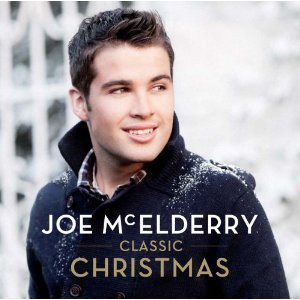 Joe who? I can say with some certainty this
Joe who? I can say with some certainty thiswon't be on any of our Christmas lists...Traditionally, Father Christmas has tended to put a CD into each of our daughters' stockings (hung on the chimney with care/in the hope that St Nicholas soon will be there). It's not exactly one of those family traditions that goes back decades - when I was a lad, Santa would have had serious trouble stuffing an LP into my regulation grey knee sock. But the CD makes music a natural gift. At least, it used to.
The thing is, young people - it is impossible type that without sounding over 70 - young people don't listen to music the way we used to. On the whole we were linear music listeners at their age (no more so than under the influence of the dreaded music cassette). We put on an album and played it from the beginning to the end. If there was a track we didn't particularly like (think Beatles' White Album) well, it might grow on us and it would soon be over.
Now, though, we're in zippy zappy instant access music world. It's not just a matter of pressing the exciting shuffle button on their iPods. Them young things never listen to an album linearly - in fact they rarely buy albums anymore, just downloading the tracks they fancy. And that's without mentioning their most IRRITATING habit, which comes to the fore when an iPod/phone is connected to the audio system in the car. They NEVER listen to a track all the way through. By around 70% of the way into the song, they are already looking for the next thing to play.
So, under the circumstances, it doesn't seem right for Father Christmas to pop a CD into those stockings. My suspicion is that he may resort to an iTunes voucher. Okay, it's not as personal as a CD of a favourite band. But it fits much better the way the yoof of today consume music. And old MC FC is never one for being behind the times.
Published on December 19, 2012 00:32



